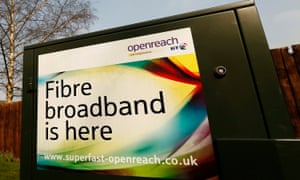Ofcom review to decide future of BT Openreach
Rival firms such as Sky and TalkTalk, who pay BT to use the ‘last mile’, say the company has underinvested in Openreach, leading to poor service

Ofcom is due to announce the initial conclusions of its Strategic Review of Digital Communications on Thursday, examining competition, investment and innovation in broadband, mobile and landline services.
The most eagerly awaited part of the review is the regulator’s recommendation on the future of BT Openreach.
Contents
What is Openreach?
Openreach is the division of BT that owns the fibre and copper wires that run from the local telephone exchange to homes and businesses. This part of the network is often called the “last mile” but in total it amounts to 76 million miles of cables snaking their way through Britain.
Openreach’s customers are the 537-odd service providers – the likes of Sky andTalkTalk – who sell telephone and internet services to households.
It was established in 2006 as part of an agreement with Ofcom to ensure that rival firms had fair access to the broadband network.
What’s changing?
Ofcom will announce the result of a review into BT’s Openreach monopoly on Thursday, after complaints from rivals that it gives BT an unfair advantage.
We don’t know exactly what will happen but Ofcom boss Sharon White has said that the status quo is the least likely outcome. While Ofcom cannot impose any changes, its recommendations carry plenty of weight, because it has the power to refer BT to the Competition and Markets Authority. That would trigger a lengthy process that nobody in the industry really wants.
One option is to recommend that Openreach be split from BT entirely. A softer alternative would be to impose more restrictions separating Openreach from the rest of BT with higher “Chinese walls” and a separate management board.
Ofcom could also call for government support for rival “last mile” networks, such as the one being developed by CityFibre.
However, a final decision might not be taken until the end of the year, or even 2017.
What is wrong with Openreach?
Nothing, according to BT. Everything, according to its competitors. Rival firms, who pay BT to use the last mile, say the company has underinvested in Openreach, leading to poor service. This affects customers by causing service interruptions and slow speeds.
Telecoms firms are also fundamentally opposed to a set-up that puts one of their own rivals in charge of a major part of the infrastructure they use.
BT’s acquisition of mobile phone operator EE has intensified calls for it to be forced to offload Openreach.
And the firm has faced criticism for dragging its feet on the installation of ultra-fast broadband, especially given that it is the largest beneficiary of about £1bn in government funding to support fast internet through Broadband Delivery UK.
What is right with it?
BT says it is the only company with the scale to manage the network, particularly while it is being upgraded to offer super-fast broadband to as many homes as possible. The company says rivals who now use fibre optic cables, thanks to BT’s investment in replacing slower copper wires, should stop moaning.
“Sky and TalkTalk have been laggards when it has come to fibre so the UK would still be in the copper dark ages had Openreach had to rely on them,” the company said.
What does it mean for BT?
Losing Openreach would be a big blow for the telecoms giant. It provided £5bn of £17.8bn group revenue last year, £2.6bn out of £6.3bn in underlying profit and more than half of its £2.8bn free cash flow. Without that money, BT might find it much harder to make the multibillion-pound bets on TV sports rights that have characterised its approach in recent years.
Who is saying what?
Vodafone chief executive Vittorio Colao says: “Openreach is clearly not working to help competition or choice.”
TalkTalk chief Dido Harding describes its service as “dreadful”, saying the business is “starved of capital”.
Sky’s chief economist Alan Sewell says Openreach is “not prioritised” by BT and is operated as a “cash cow” for the company.
Ofcom chief executive Sharon White said: “I think there will be change. We’re looking at a number of options but I think it is very unlikely we will conclude that the status quo, which has worked over the last 10 years, is where we are likely to be over the next decade.”
